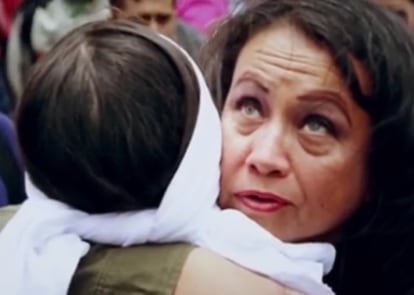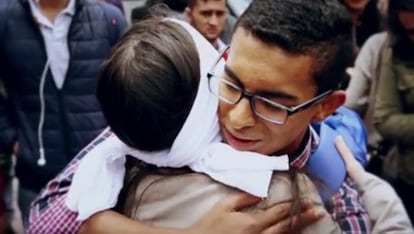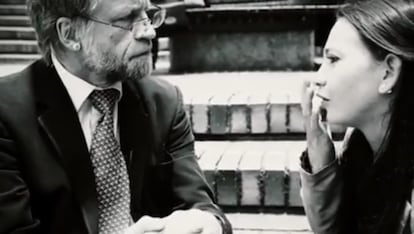The former FARC guerrilla seeking forgiveness through hugs
“We had to do something to explain to people why the war has to end”

Just three days before the Revolutionary Armed Forces of Colombia (FARC) and the government of President Juan Manuel Santos signed the peace accords that aim to bring a definitive end to the country’s 50-year-old armed conflict, Esperanza, a former guerrilla, met with Antanas Mockus, ex-mayor of Bogota, to make a confession. “I was recruited when I was 13 years old, I stayed for eight years and deserted when I was 21,” she says. “I need help to ask for forgiveness.”
After its success on the internet, the video went viral at a crucial moment in Colombian history
The progressive politician and advocate for peace shared a video of her confession with his 800,000 Facebook followers. “During a work meeting with Antanas and his wife we decided that we had to do something to explain to people why the war had to end,” John Portela, Mockus’ press attaché, told EL PAÍS. The short video, directed by Portela, has already had more than 900,000 visits and more than 33,000 people have shared it with others since it was posted on September 23.
Portela met Esperanza through the Colombian Agency for Reintegration (ACR), an organization that has worked with many of the more than 57,000 rebel soldiers who demobilized between 2003 and 2016. “She did know who she was going to talk to, what she was going to say to him and that we were going to tape that moment,” Portela says. The former mayor knew that he was going meet with a former rebel soldier but he did not know her identity or story. “It was surprising for me,” Mockus says. “The question that came out of me was: ‘What was your happiest moment?’ And suddenly I saw her light up and she said: ‘Having my son.’” Sentimental music cued up as Mockus and Esperanza, moved beyond words, touch foreheads.

“I have focused on communication that is about not asking people what they did wrong or what their sins were as if one had the authority or right to forgive them,” the politician says. Mockus was one of Bogota’s most popular mayors because he encouraged tax-payers to take part in government, on one occasion bringing mime artists out on the streets to help people learn road rules. Mockus has not only helped Esperanza ask for forgiveness, he also warns her that her decision carries a great risk: “Whoever asks for forgiveness must be prepared to hear ‘no.’ There is no automatic forgiveness. It must be freely given.”
Esperanza leans on Mockus’ arm as she descends the stairs of Universidad Javeriana de Bogotá, one of the country’s most prestigious. Esperanza words can be read on a poster: “I was recruited at 13 years old by the FARC, today I ask for forgiveness. Will you give me a hug?”
There is no automatic forgiveness. It must be freely given Antanas Mockus, former mayor of Bogota
Over the last decade, this formula has been used in large demonstrations all over the world. But in this case, the woman asking for hugs, a former FARC soldier, covers her face with her one-year-old son’s cloth diaper. “We were going to evaluate whether she would show her face or not,” Mockus says. “She herself decided to cover up and it surprised me because a bandage hides but she chose the most innocent object to do it with.”
Students soon recognize Mockus. “We did not ask anyone to come,” Portela says. “The people who approach her, hug her and whisper in her ears did it because they wanted to.”

The black and white video switches to color when Esperanza receives the first hug from a young man. “It was my personal decision,” the director says. “I decided to symbolize that her life was starting over.” Portela has made similar emotional videos before but never one with this level of impact. “We did not have money to make a seven-minute commercial, so we decided to use Antanas’ social media networks, which are very powerful.”
After its success on the internet, traditional media picked up the video and it went viral at a crucial moment in Colombian history. The images explain the reality of the fratricide and the need for forgiveness in order to begin reconciliation. It has also become one of the most successful campaigns calling on Colombians to vote “Yes” on October 2 in the referendum that will determine whether to uphold or reject the peace deal the government has negotiated with FARC leaders.
English version by Dyane Jean-François.
Tu suscripción se está usando en otro dispositivo
¿Quieres añadir otro usuario a tu suscripción?
Si continúas leyendo en este dispositivo, no se podrá leer en el otro.
FlechaTu suscripción se está usando en otro dispositivo y solo puedes acceder a EL PAÍS desde un dispositivo a la vez.
Si quieres compartir tu cuenta, cambia tu suscripción a la modalidad Premium, así podrás añadir otro usuario. Cada uno accederá con su propia cuenta de email, lo que os permitirá personalizar vuestra experiencia en EL PAÍS.
¿Tienes una suscripción de empresa? Accede aquí para contratar más cuentas.
En el caso de no saber quién está usando tu cuenta, te recomendamos cambiar tu contraseña aquí.
Si decides continuar compartiendo tu cuenta, este mensaje se mostrará en tu dispositivo y en el de la otra persona que está usando tu cuenta de forma indefinida, afectando a tu experiencia de lectura. Puedes consultar aquí los términos y condiciones de la suscripción digital.









































